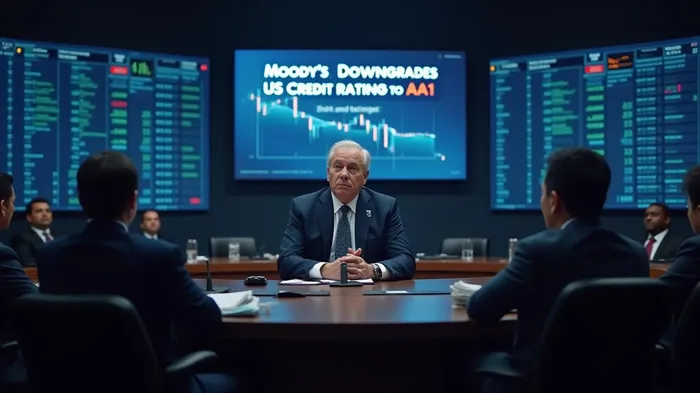Moody's Downgrades US Credit Rating to Aa1 Citing Debt Concerns
On Friday, the international credit rating agency Moody'sMCO-- downgraded the United States' sovereign credit rating from Aaa to Aa1. The decision was based on the increasing ratio of government debt to interest payments, a move that has sparked significant controversy and criticism from the White House. The White House, through President Trump's spokesperson, accused Moody's of making a political decision, highlighting the agency's chief economist's past affiliations with the Obama administration and his consistent opposition to Trump's policies.
Moody's, in its statement, acknowledged the U.S.'s significant economic and financial advantages but noted that these advantages are no longer sufficient to offset the deteriorating fiscal indicators. The agency pointed out that over the past decade, the U.S. government's debt and interest payment ratio has grown at a rate higher than that of similarly rated countries. This downgrade follows previous actions by the other two major credit rating agencies, which had already downgraded the U.S. from its highest rating of AAA.
The symbolic significance of this downgrade cannot be overstated. It marks a turning point in the perception of the U.S. as a safe haven for global investors. The U.S. government's debt and deficit issues have been a long-standing concern, and this move by Moody's underscores the growing pressure on the U.S. to address its fiscal challenges. The U.S. federal budget deficit currently stands at nearly 2 trillion dollars, equivalent to more than 6% of its GDP.
The timing of Moody's decision is particularly noteworthy, as it comes at a critical juncture in U.S. fiscal policy. The U.S. Congress is currently working on a comprehensive tax bill that aims to extend the tax cuts implemented during Trump's first term and provide additional tax relief as promised during his re-election campaign. However, the bill faced a setback when the House Budget Committee rejected a Republican-proposed tax and spending package, with five conservative Republican members and all Democratic members voting against it due to concerns over the bill's cost.
The White House has been vocal in its support for the tax bill, with Trump urging Republican lawmakers to unite behind his economic agenda. In a post on Truth Social, Trump called for an end to infighting within the Republican Party, urging them to focus on delivering results. The political climate surrounding this issue is tense, with the White House and Congress at odds over the best path forward for U.S. fiscal policy.
The downgrade by Moody's has sparked a debate among economists and policymakers about the future of U.S. fiscal policy. Some argue that the fundamental issue of declining foreign demand for U.S. debt and the need for continuous refinancing remains unchanged. Others question the timing and assumptions behind Moody's decision, suggesting that the agency's decision was politically motivated.
The impact of this downgrade on U.S. policy remains to be seen. While it may not immediately lead to changes in Washington's fiscal approach, it serves as a stark reminder of the challenges facing the U.S. economy. The ongoing debate over tax policy and the need for fiscal discipline will continue to shape the U.S.'s economic trajectory in the coming years. 
Stay ahead with real-time Wall Street scoops.
Latest Articles
Stay ahead of the market.
Get curated U.S. market news, insights and key dates delivered to your inbox.

Comments
No comments yet